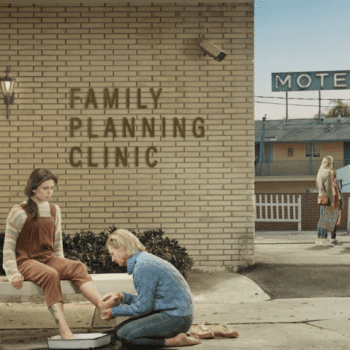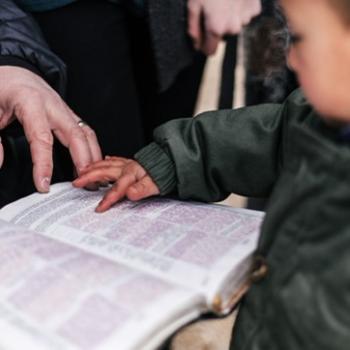I don’t consider myself to be an emotionally-driven man, nor does anyone who knows me personally. My wife has quipped that I can have the emotional equivalency of a rock, where my mom has oft retorted with the Vulcan greeting when she’s heard my thoughts on a particularly emotionally charged matter. In one sense this has proved to be an incredible asset, as I can brush off nearly anything that would cause many others to be rightfully upset. I get over pains quickly. I can think through issues quickly rather than simply react out of impulse. I don’t get anxious over things. I am able to reconcile the truth of the Scriptures with my circumstances rather quickly as well.
Yet what could be said to be a strength is also perhaps my greatest weakness. I have had to learn how to sympathize with people who struggle with regulating their emotions. I can often appear aloof or cold-hearted when I approach issues that I have already worked out in my own head. It isn’t that people are even necessarily in disagreement with what I have to say, but rather, they often just need to take more time to process through something emotionally than I. That can be a real point of contention when you approach things purely on rationalistic grounds, especially when sometimes a simple hug and word of encouragement will do better than anything else.
I am also fully aware that emotions are a gift from God that ought not be squashed down simply because they can be deceptive and misleading. What this looks like on a practical level for me is that I can often approach my relationship with God as a theological enterprise rather than an experiential one. I believe the former is greater than the latter, we must know God rightly to relate to Him rightly—but I recognize God has not revealed Himself for the purpose of simply engaging the mental faculties. He has revealed Himself to us so that we might know and love Him. If my theological mind does not engage God alongside my devotional heart and soul, I am certainly not loving God with all my being, and thereby in disobedience to the Greatest Commandment.
I’m not what I’d call an emotional man in the least bit, but I believe I’ll cry when we are finally able to gather with the saints again in the household of the Lord. I miss my family in Christ a tremendous amount. I miss being able to shake hands with the men of the church and inquire how they’ve been doing. I’ve been trying to connect with some through the phone, but it just isn’t the same. I miss hearing the children sing loudly and out of tune, and hearing moms and dads, grandmas and grandpas, singles and marrieds alike as well. I feel the absence of partaking in the Lord’s Supper with my brothers and sisters. Perhaps most of all, I miss sitting under the preached Word and, as my elder’s wife put it, hearing the faithful turn their pages to open up the Scriptures and follow along. Yet I also deeply regret not being able to meet with some of the men as I was on weekday mornings and our small group on Wednesday nights.
I’m not what I’d call an emotional man, but I am growing increasingly frustrated with the situation at hand. In a sense, you might call it: a foreboding incompleteness that is growing. Perhaps the pinnacle of this was on Easter Sunday. The family climbed out of bed and got dressed for my pastor’s live-streamed study. We could type in a “hello” to the members of our church, and as great as that is, it frankly sucks. For the past two years we’ve been part of a “celebration service” with a recent church plant. We gather together to celebrate our broader body in the Midwest and have the pleasure of seeing what God is doing in the people of this plant. We see old friends, make new ones, and witness wonderful testimonies of God’s grace as newly converted Christians rise and make a proclamation of their faith in Christ. We sing many, theologically-rich songs and hear the Word exposited, and then we go on our way.
Not so for this Easter. Instead, I gathered my wife and three children to the living room where we sat on the couch and watched an exquisite and hope-filled study on the resurrection. It was truly wonderful and lifted my spirit—yet it was not the same. I sit today thinking of the study we will sit through as a family once more tomorrow, with gladness of heart for my pastors and their faithfulness to shepherd, yet with sorrow as we once again will not be in the presence of our brothers and sisters. Here I am, introvert of introverts, missing people. Yet not just people, my people. It is this that lets me know I am truly alive in Christ. If my heart did not yearn for them and for the assembly, I would have every reason to fear I am not in Christ. If my “emotional equivalency of a rock” did not dissipate during this time and I remained unchanged, even whilst separated from the body, there would be every reason to doubt the credibility of my profession.
I would argue though, as I have long believed, that one ought to feel an insatiable hunger toward the church in general, but especially during this time. The church is so much more than simply a gathering of like-minded people. The church is the place where believers can find delight in their unity and service to one another (1 Cor. 12:12-27). It is where they can gather to sit under the authority and preaching of their under-shepherds, who cause them to grow in maturity and attain to the unity of the faith and knowledge of the Son of God (Eph. 4:11-13). It is where they can be equipped to bear one another’s burdens (Gal. 6:2), encourage one another (1 Thess. 4:13-18; 5:11), build each other up in their most holy faith (Jd. 1:20), push one another on to persevere to the end (Heb. 10:23-25), and pour out compassion (Eph. 4:32), forgiveness (Col. 3:13), love (Jn. 13:34; 1 Jn. 4:7), and brotherly devotion (Rom. 12:10). Most of all though, it is where this body of people can come together in service to their King, Jesus Christ, who redeemed them from the curse of sin and brought them into newness of life. In other words, we come together not simply to serve one another, but to praise our beloved King for His great mercy.
The genetic makeup of any genuine church is an assembly of people from all walks of life. Some of these people you might naturally be friends with outside of the church’s walls—yet many you share nothing in common with but the atoning blood of your Lord and Savior, Jesus Christ. Yet this bond supersedes any other relationship that this earth has to offer. The unity Christians share in Christ is greater than the love between spouses, family members, or even the best of friends. That means the weakest relationship you hold with someone in Christ is better than the best relationship you hold with someone outside of Christ. In other words, you have a greater bond through the blood of Jesus with the believer you don’t get along with, than your best friend that you get along with famously, who isn’t a Christian at all. The reason for this is simple: we have a blood-bought unity. Nothing compares to this. There is nothing stronger than it. When everything is said and done and the earth is consumed in the fires of judgment, this bond will remain.
If you’re not missing the assembling of your fellow believers by this point, not only am I genuinely concerned for your soul, but I wonder what your previous experience of church was like to begin with. I wonder, as would the apostle John, if you have any genuine love for Christ. If you claim Christ and nothing has changed for you since shelter in place measures have been implemented for COVID-19; if no twinge of sadness, anger, frustration, discouragement, or simply a sense of incompleteness, has come over you in any way, then you ought to be incredibly concerned over the state of your soul. You ought to be growing an insatiable hunger to return to the house of the Lord and worship with the brethren again. You should be incredibly discontent with the way things are. There should be a despair in your heart in not being able to go to church.
If these things are not true of you, it is time to consider one of two things may be true of you:
- You have not yet trusted in Christ for the forgiveness of sin, because you do not show a love of the brethren. Genuine love of the brethren manifests itself through sorely missing them when you are not able to be in their presence. Just as a wife misses her children when they are gone overnight, so too does the Christian miss their brothers and sisters when they are not in sight. No genuine Christian can flourish on their own, nor remain on their own, as they were saved unto a body. If you feel no pain of separation, it is highly probable you were never joined to the body to begin with.
- You have forgotten your first love and made something an idol in place of your Savior, whether it be safety, comfort, or fear of death. A genuine love of the brethren will manifest itself through a sense of incompleteness when the Christian is apart from the body. No eye can be content without the head; no toe without the foot. No part of the body can function properly or feel anything but a sense of disjointedness when they are removed from the rest of the body. The church was designed to fit together in harmony for mutual edification. If you feel no sense of incompleteness, or perhaps you sense it, but it is not strong in you, it is highly probable you desire to be joined to something of lesser significance than the body of Christ.
As a final word, I want to make one thing a bit clearer: this applies to your local church that you have covenanted with, or simply been attending. I write none of this with generalities or platitudes in mind. The Scriptures presuppose that we will be connected with a local manifestation of the body rather than just “the body” more generally speaking. What that then means is that if you are “tuning-in” to another church’s service rather than your own, this also ought to be something that causes you to pause in reflection and take stock. The point I’m driving to is not that you can’t or shouldn’t listen to others, but simply that these men are not your pastor and their church is not your church.
No people other than your elders are accountable for your souls, at least not to the same degree. People will invariably be accountable to some degree on the basis of their words, no doubt, yet they are not the ones whom God has primarily charged to shepherd you (Heb. 13:17). God calls you to obedience and submission to your local church’s elders. Not John MacArthur. Not John Piper. Not [insert famous pastor here]. Not some random dude on the internet with an opinion (i.e. me). Your elders. To put it another way: you are entrusting your soul to someone God has not. You have been gifted your pastor and your local church. If you’re not missing them in any sense, there is a fundamental rift in your heart here as well.













